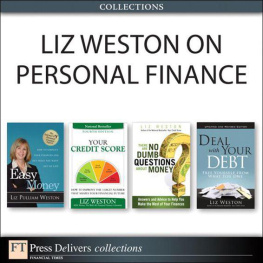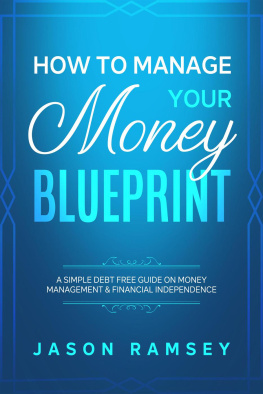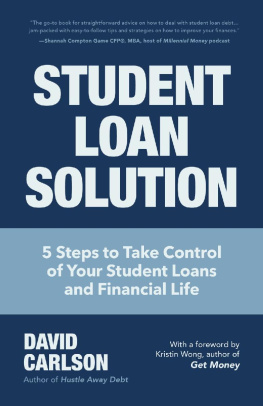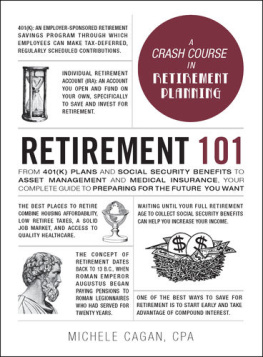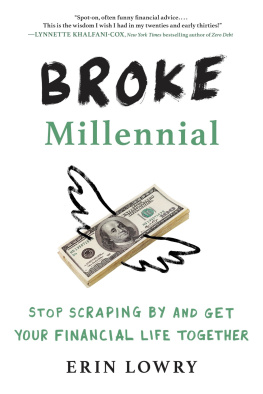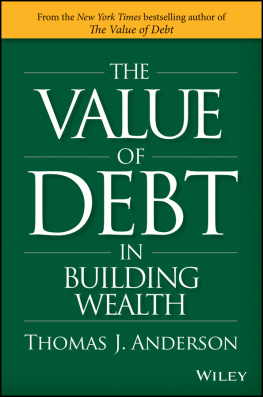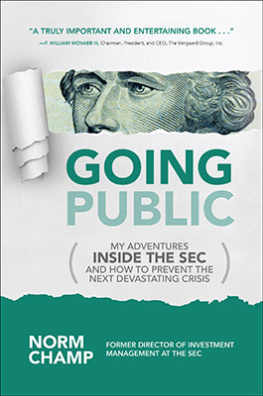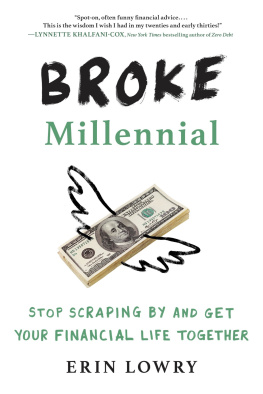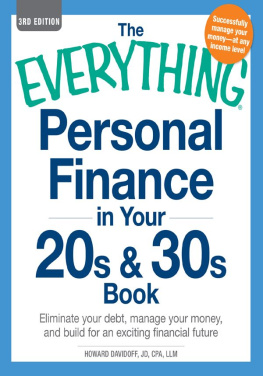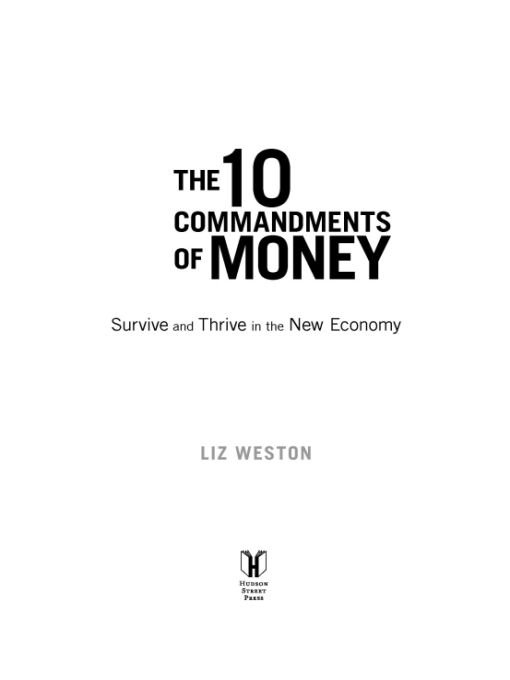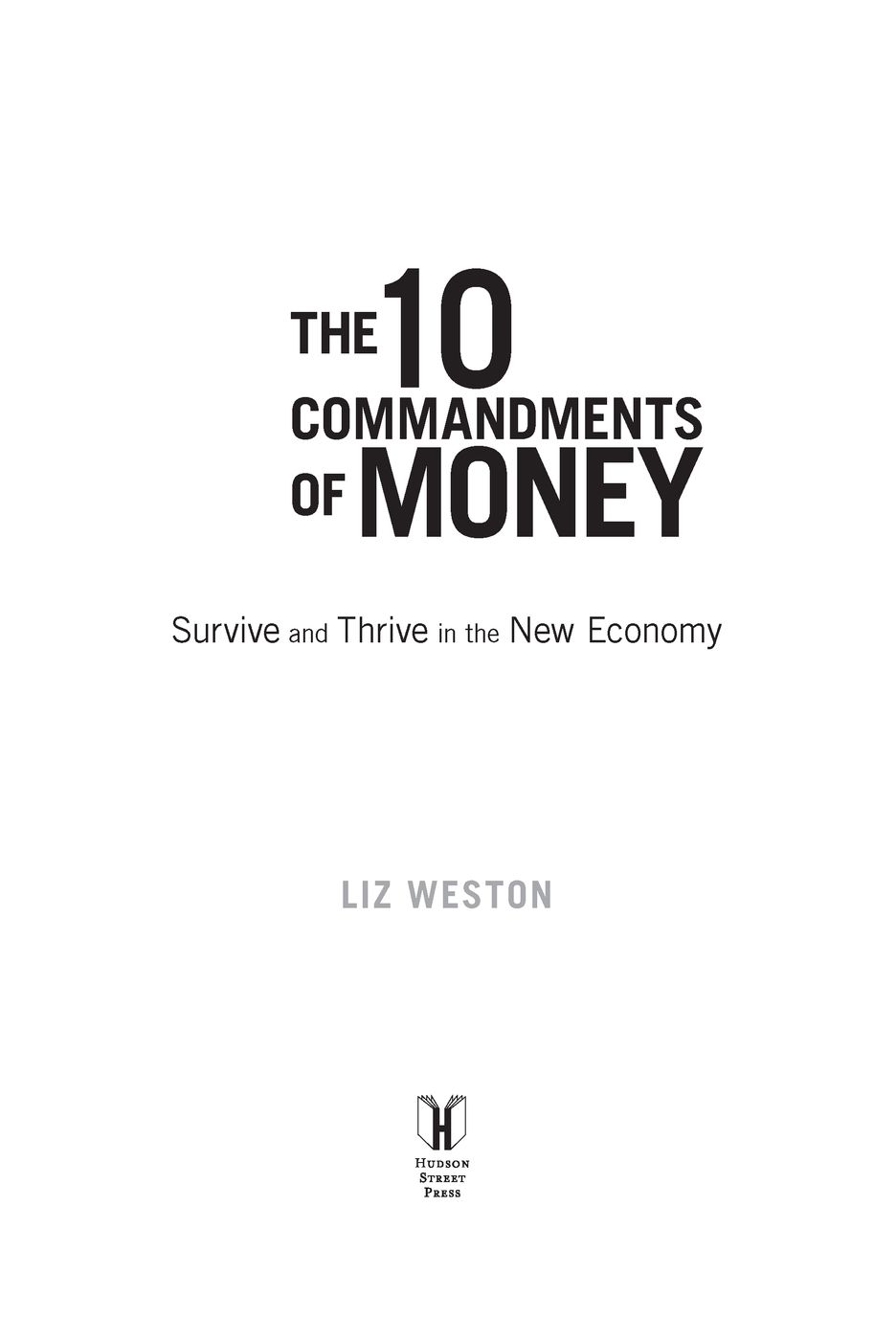Table of Contents
To Will, as always
ACKNOWLEDGMENTS
Too often author acknowledgments are like those overlong acceptance speeches at the Academy Awards: you want someone to start up the orchestra to drown them out.
So Ill keep this short.
I need, want and desire to thank MSN Money for its generosity in allowing me to excerpt my columns for this book.
Working with my editor, Meghan Stevenson, and her boss, Caroline Sutton, was an unexpected delight. Although I wasnt responsible, I applaud Meghan for transforming her wine budget into a 401(k) contribution.
This is the part where I start to gush about my agent, Stephen Hanselman, of Level5Media. Tim Ferris is right: Stephen is the best agent in the worldperiod. I count among my luckiest days the day that we met. (And publicist Stephen Crane, thank you for arranging the introduction.)
And now to burble on about my family: my ever-present, ever-loving, ever-supportive husband and our darling daughter, who waited with varying degrees of patience for Mommy to finish the Darn Book so she could get her first dog.
Finally, Ralph Waldo Emerson said that our growth is seen in the successive choirs of our friends. If thats the case, I must be seventeen feet tall, because my chorale consists of amazing women who freely offered love, encouragement and forgiveness when I dropped out of sight for months to write this book. Marla, Barb, Kelly, Melissa, Bambi, Morgan, Aldina, Kathy: thank you.
INTRODUCTION
The financial crash and subsequent recession exploded many peoples ideas of how money was supposed to work. Assumptionsabout risks and rewards, markets and returnslay in ashes. People saw the value of their biggest assets, their homes and their retirement portfolios, plummet faster and farther than theyd ever thought possible.
Even the safest-seeming investments, including savings accounts and money market funds, suddenly didnt feel so secure as banks failed and financial firms broke the buck, letting money funds lose principal. With the speed of a catastrophic wildfire, the financial crisis whipped through the economy and around the world, plunging economies from prosperity to despair seemingly overnight.
The worst financial meltdown since the Great Depression left many people reeling, frightened for the future and despairing that they would ever meet their goals. The terror wasnt limited to the little guys. Many of the pundits and personalities who had been cheerleading the bubble years gave in to panic as well. Instead of offering wisdom, they preached hysteria. Some predicted utter ruin while others abruptly changed their strategies and advice, insisting that what used to work no longer would.
In a way, they were right. The money rules that emerged during the stock and real estate bubbles were ill conceived, dangerous and unsustainable. Particularly scary was the notion that risk no longer mattered or could be eliminatedthat real estate always rose in price and so did stocks, if you held them long enough.
Other ideas took hold that were equally wrong and scary: that credit card debt was somehow normal, that traditional mortgages no longer made sense, that borrowing a fortune for education was good debt. But many of the solutions prescribed at the height of the crisissuch as shunning stocks entirely, making big plays in gold, ignoring credit card debt to pile up big cash reserveswere equally misguided.
These notions grew up in part because of our great and long-standing ignorance about money, a financial illiteracy that makes us vulnerable to the illegal cons of scam artists as well as the legal ones perpetrated by Wall Street, lenders and corporations.
Whats needed now is some sanity rooted in personal responsibility. There are new rules of money that will help you avoid making critical mistakes, survive the bad times and thrive in the good ones. There are easy lessons you can learn now about how money works and how the economy really functions that will help you make smarter choices for years to come no matter what life throws your way. Most of all, there are important truths you can absorb about how much power you have to control your own destinytruths that can help you separate the helpful from the hysterical and move forward with confidence.
These arent necessarily the money rules your parents learned, or their parents. The realities of finance have changed too much for old-school strategies to have much relevance.
Lets take just one example. For previous generations, living within your means was a fairly simple formula. You put aside 10 percent or so of your income for a rainy day and lived on the rest.
Consumer credit wasnt widely available. The closest most people got was an account at their local grocer that they could pay off once a month or a layaway plan at their favorite department store. If you did get a loan, for a car or a home, the lender was pretty conservative about how much you could borrow.
All that has changed.
Instead of just saving for a rainy day, people now have to save enough to cover most of the costs of their retirementa period that can last decades, instead of just a few years. Traditional pensions are disappearing, and even employer help in the form of company matches in 401(k) plans has disappeared at some firms.
Then theres saving for college. Instead of a luxury for the elite, a college education is now a necessity for most. Although college can be a tool for economic advancement, these days its also required if you dont want to slip down the financial ladder. Because of changing job markets and employer requirements, the son or daughter of a union worker who had only a high school diploma must now have a two-year degree, and more likely a four-year degree, simply to match the parents earning power and benefits. But the costs of college have exploded, far outpacing inflation and the ability of many families to pay. Medical and housing costs have soared as well, taking much bigger chunks of workers paychecks than in the past.
At the same time these changes were occurring, the availability of consumer credit was soaring. Between 1990 and 2007, credit card debt rose fivefold as card issuers competed aggressively to sign up new customers and extend more and more credit to the ones they had. Lenders standards got looser and looser. The idea that a lender wouldnt let you take on a loan you couldnt afford became a joke. With sophisticated analytics, credit scoring formulas and a whole market system designed to whisk risk away from lenders and onto investors, what the borrower could afford became an afterthought, and then lenders didnt think about it at all.
All this credit papered over the crisis many American families experienced: their incomes stagnated while their costs rose. Median household income peaked in 1999, according to the U.S. Census Bureau, and a decade later inflation-adjusted incomes still hadnt bounced back. For many families, borrowing became the way to stay afloat and maintain the lifestyle they thought theyd already achieved.
Credit got tougher to get as lenders pulled back from their Great Recession losses. But it is still possible to get a far bigger mortgage or auto loan than you can comfortably afford. Its still possible to get in over your head with credit card debt. Meanwhile, lenders have come up with new ways to snare people with short-term borrowingpayday loans, payday advances and bounce protectionthat can quickly upend a budget with triple-digit interest rates.


